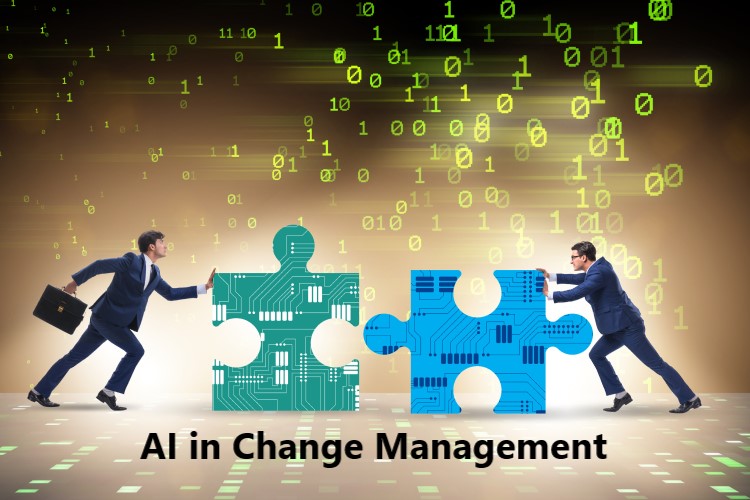The Integration of AI in Change Management is transforming how organizations approach and manage change, enabling more efficient and effective transitions. As businesses face an increasingly complex and dynamic environment, the need for agile and adaptive change management strategies has never been greater. AI technologies are now playing a pivotal role in these strategies, offering new ways to manage, monitor, and drive organizational change.
The Growing Role of AI in Change Management
The Integration of AI in Change Management is growing as companies see AI’s potential to enhance decision-making, communication, and process efficiency. AI tools analyze vast data sets, identifying patterns, predicting outcomes, and providing insights to inform change management strategies. These capabilities are especially valuable in large organizations where managing change requires coordination across multiple departments, teams, and locations.
AI’s real-time data processing and analysis is a significant contribution to change management. Traditional data gathering often involves time-consuming manual processes, causing delays in decision-making and implementation. In contrast, AI processes data quickly from various sources, giving leaders timely insights to make faster, informed decisions. This speed is crucial in today’s fast-paced environment, where delays can lead to lost opportunities or competitive disadvantages.
Furthermore, AI enhances communication throughout the change management process. By analyzing communication patterns and employee sentiment, AI can identify potential resistance and recommend strategies to address it. This proactive approach ensures employees are more engaged and supportive, leading to smoother transitions and successful outcomes.
AI-Driven Predictive Analytics in Change Management
AI-powered predictive analytics are revolutionizing how organizations anticipate and manage change. The Integration of AI in Change Management enables companies to forecast the potential impact of change initiatives before implementation. This ability allows organizations to identify potential risks and develop mitigation strategies, reducing the chances of unforeseen challenges.
For example, AI-driven predictive analytics can assess how different employee segments might respond to a proposed change using historical data and sentiment analysis. These insights enable change managers to tailor communication and training programs to meet the specific needs of different groups, improving the effectiveness of the change process. Additionally, predictive analytics help organizations identify the best timing for implementing changes, maximizing success.
AI’s predictive capabilities also extend to monitoring change initiatives’ progress. By continuously analyzing implementation data, AI provides real-time feedback on strategy effectiveness and suggests adjustments as needed. This continuous monitoring ensures organizations stay on track and make data-driven decisions to keep change initiatives moving forward.
Enhancing Employee Engagement with AI
The Integration of AI in Change Management goes beyond efficiency improvements; it plays a crucial role in enhancing employee engagement. A significant challenge in managing change is gaining employee buy-in and ensuring everyone aligns with the new direction. AI addresses this challenge by providing personalized communication and support throughout the change process.
AI-driven tools analyze employee data to identify individuals or groups struggling with change or likely to resist it. By understanding these specific concerns and needs, organizations can offer targeted support, such as tailored training programs or personalized communications. This targeted approach helps alleviate concerns, build trust, and increase engagement, leading to a more successful change initiative.
Additionally, AI facilitates ongoing feedback and communication between employees and management. For example, AI-powered chatbots can answer employee questions, provide updates on change initiatives, and gather feedback. This two-way communication ensures employees feel heard and supported, which is essential for maintaining morale and commitment during times of change.
Overcoming Challenges with AI Integration
While the Integration of AI in Change Management offers many benefits, it also presents challenges organizations must address to realize its potential. One primary challenge is ensuring that AI tools are used ethically and transparently. Employees may worry about privacy and how their data is used, especially with monitoring communication and behavior. Organizations must be transparent about their AI use, clearly communicate its benefits, and handle data responsibly to address these concerns.
Another challenge is the need for ongoing training and development to ensure employees and leaders effectively use AI tools. The rapid pace of technological advancement means organizations must invest in continuous learning to keep their teams up-to-date with the latest AI capabilities. This investment is crucial for maximizing AI’s benefits in change management and ensuring the technology is used effectively.
Despite these challenges, the benefits of integrating AI into change management far outweigh potential drawbacks. By leveraging AI, organizations can create more agile, responsive, and successful change management strategies that align with modern business demands.
Conclusion
The Integration of AI in Change Management is transforming how organizations approach change, offering new tools and strategies to navigate the complexities of today’s business environment. By harnessing the power of AI, companies can enhance decision-making, improve communication, and increase employee engagement, leading to more successful and sustainable change initiatives. As AI technology continues to evolve, its role in change management will only become more significant, making it an essential component of any forward-thinking organization’s strategy.


